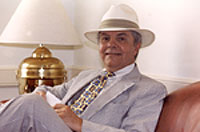 Many WRA alumni, students and friends may be unaware that Cleveland Hopkins International Airport was founded by and named in honor of William R. Hopkins, WRA Class of 1892. Hopkins and four of his brothers were WRA graduates, and all five went on to distinguished careers. William R. Hopkins gained an unusual level of recognition as the result of his high-profile political career.
Many WRA alumni, students and friends may be unaware that Cleveland Hopkins International Airport was founded by and named in honor of William R. Hopkins, WRA Class of 1892. Hopkins and four of his brothers were WRA graduates, and all five went on to distinguished careers. William R. Hopkins gained an unusual level of recognition as the result of his high-profile political career. Born in 1869 to parents of Welsh descent, Will Hopkins was the sixth of ten children. Eight of the Hopkins brothers, including Will, worked in Cleveland steel mills before pursuing higher education. Hopkins was already 20 before he enrolled at WRA. Following graduation, he went on to earn both a bachelor's and a law degree from Western Reserve University (now CWRU), and while still in law school was elected to Cleveland City Council. Will and his entrepreneur brother, Ben, teamed up to build a short line railway that linked industries in the Cleveland Flats area. Will continued to be active in politics, and in 1924 he was named city manager when Cleveland was the sixth largest city in the U.S.
During his seven years as manager, Hopkins saw the completion of the Terminal Tower complex and construction of the Municipal Stadium and the Convention Center on the Mall. He persuaded council to buy 700 acres off Brookpark Road for a state-of-the-art Cleveland Municipal Airport, replacing a small airstrip on Woodland Avenue. The new facility helped guarantee that the city would remain on the airmail route between New York and Chicago. By the end of the 1920s, it had proven to be one of the city's finest assets. The airport attracted the national air games and brought in flying celebrities like Amelia Earhart and Charles and Anne Morrow Lindbergh, who helped promote the airport as a hub and a destination.
Although Hopkins lost his job in 1930 when the city returned to the mayor/council form of government,
 he continued as a member of council and was an important player in the civic life of Cleveland. Eventually, the city named the airport he had nurtured: Cleveland Hopkins International Airport. Recently, the airport added a large portrait of Hopkins that incoming passengers pass on the main concourse. It is something of a belated tribute to the man whose foresight made this airport a reality. Hopkins has an imposing monument at Lakeview Cemetery in Cleveland which can be located on a visit to this large and magnificent cemetery where many of Cleveland's most important people are buried. Your reporter easily found the Hopkins tomb on a recent visit.
he continued as a member of council and was an important player in the civic life of Cleveland. Eventually, the city named the airport he had nurtured: Cleveland Hopkins International Airport. Recently, the airport added a large portrait of Hopkins that incoming passengers pass on the main concourse. It is something of a belated tribute to the man whose foresight made this airport a reality. Hopkins has an imposing monument at Lakeview Cemetery in Cleveland which can be located on a visit to this large and magnificent cemetery where many of Cleveland's most important people are buried. Your reporter easily found the Hopkins tomb on a recent visit.NOTE: William R. Hopkins served as a member of the WRA Board of Trustees from 1925 until his death in 1961 at age 91.

